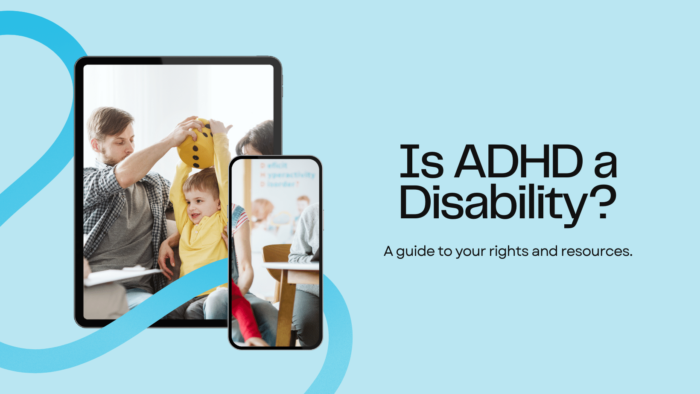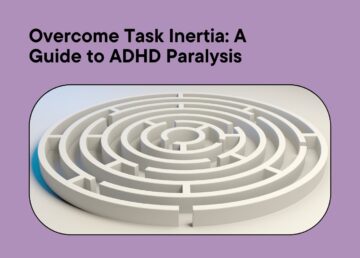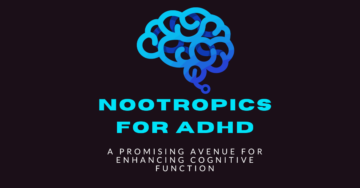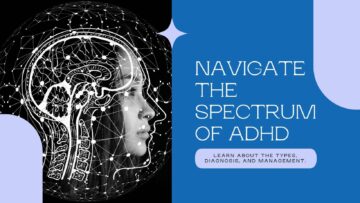
Having ADHD, or attention deficit hyperactivity disorder, can be challenging, especially when trying to fit in with certain societal norms and expectations. Some ADHD symptoms can cause issues when doing schoolwork and job assignments.
However, ADHD diagnosis should not restrain people from living their lives to the fullest. Hence, those with ADHD need access to certain resources and accommodations to help them integrate into society.
This comprehensive guide will shed light on an often-asked question: Is ADHD considered a disability? If you or a loved one are navigating life with ADHD, understanding your rights and available disability benefits is crucial.
Defining the Terms: Is ADHD Considered a Disability?

ADHD is characterized by challenges in maintaining attention, controlling impulses, and regulating hyperactivity, among other symptoms.
There are several types of neurodivergent disabilities defined in the Americans with Disabilities Act (ADA), such as:
- Developmental disability
- Learning disability
- Attention deficit hyperactivity disorder (ADHD)
- Cognitive disability
While ADHD is recognized as a neurodevelopmental disorder, ADHD also qualifies as a disability in legal and medical perspectives in many countries, such as the United States, Australia, Canada, several European Union members, and others, due to its substantial impact on daily functioning.
In some cases, ADHD is followed by other disorders, such as learning disabilities, intellectual disabilities, developmental disabilities, or others, that can affect symptoms and make them more severe.
Therefore, people with ADHD, which impacts daily functioning, can receive disability benefits. Children with ADHD can receive special education services, and accommodations that grant better life quality.
Understanding ADHD as a neurodevelopmental disorder
Developmental disorders of the nervous system encompass a range of conditions that affect the growth, development, and functioning of the nervous system. While attention deficit hyperactivity disorder (ADHD) is one of them, there are others that fall under the same category.
These are:
- Autism spectrum disorder (ASD)
- Learning disability (dyslexia, dyscalculia, etc.)
- Tourette syndrome
- Down syndrome
- Intellectual disability (DI)
While ADHD and other neurodevelopmental disorders are recognized as disabilities, it’s important to remember that the severity of the disability is the critical factor when aiming to receive disability benefits and accommodations.
ADHD under disability law: a closer look

In the United States, the Americans with Disabilities Act and the Rehabilitation Act protect the rights of individuals with disabilities, including those with ADHD.
These laws prohibit discrimination against individuals with disabilities and require reasonable accommodations to ensure equal access and opportunity. Therefore, individuals with ADHD are entitled to certain rights and protections in various settings, including the workplace and schools.
Severe ADHD itself can be problematic and difficult to manage. Due to its symptoms, an individual might find it hard to However, it also tends to affect an individual’s overall mental health and cause issues, such as:
- Mood disorders and mood swings
- Substance abuse problems
- Self-esteem issues
- Poor coordination
ADHD disability benefits
Receiving disability benefits for ADHD is possible if your condition significantly impairs your daily functioning and ability to work.
According to federal law, federal benefits eligibility hinges on the severity of your impairment. You need documented medical evidence and the impact on your employment to prove it.
However, an ADHD diagnosis alone does not grant special education services for children, supplemental security income (SSI), or Social Security Disability Insurance (SSDI) and workplace accommodations for adults.
Steps to take when aiming to receive ADHD disability benefits
When aiming to receive disability benefits, having a diagnosis is not enough – it’s necessary to have acceptable documentation that you have all of the following symptoms:
- Marked impairment in age-appropriate social functioning
- Marked hyperactivity (e.g., extreme restlessness)
- Marked inattention
Additionally, you must be unable to perform any “substantial gainful activity,” or SGA, for a period of at least a year. SGA refers to your ability to work and earn money and is reviewed annually to evaluate if you’re still eligible for benefits.
Applying for this involves submitting a comprehensive application detailing your medical history and acceptable supporting documentation of how ADHD affects your life.
ADHD in the Workplace: Rights and Protections

According to the employment law, individuals with ADHD have the right to work in environments free from discrimination and receive reasonable accommodations supporting their work performance.
This could include flexible work hours, modified tasks, or a quiet workspace to minimize the effect of ADHD’s hallmark symptoms.
It’s vital to discuss accommodations with mental health professionals and your employer to figure out how to help you function effectively, improve work performance, and empower you to reach your potential.
Legal protections for individuals with ADHD
Under the ADA, employers are required to provide reasonable accommodations for employees with disabilities, including ADHD.
These accommodations are adjustments or modifications that allow individuals with disabilities to perform their job duties effectively. Reasonable accommodations are specific to each individual’s needs and may involve changes in work environment, job tasks, or policies.
While many adults with ADHD can function effectively at work and in their personal lives, those with significant impairment need certain assistance and adjustments as these can significantly improve performance.
Moreover, receiving accommodations can help people feel more secure and capable of completing tasks, thus improving general self-esteem.
Navigating small businesses: are employees with ADHD still protected?
Even in small businesses, employees with ADHD are protected by disability law.
If you’re facing challenges obtaining the accommodations you need, you can seek guidance from the Equal Employment Opportunity Commission (EEOC) or legal counsel. Remember, your rights should not be compromised based on the size of the company you work for.
It’s important also to consider the perspective of small business owners who may be dealing with this condition themselves. Like employees, small business owners with ADHD can also benefit from reasonable accommodations to help manage their unique challenges.
Running a small business requires juggling numerous tasks, making quick decisions, and staying organized – all of which can be challenging for individuals with ADHD. Recognizing your specific needs is the first step in seeking appropriate accommodations.
Quiet workspace, extended deadlines, and other accommodations can help small business owners with ADHD regulate impulsive behavior, reduce performance anxiety, improve focus, and manage ADHD symptoms at work.
Communicating your needs: when and how to inform your employer
Open and honest communication with your employer is key. When disclosing your ADHD, focus on how your specific needs relate to your work performance.
Providing your employer with relevant medical documentation and potential accommodations can facilitate a more productive conversation.
If you have difficulty determining what accommodations could benefit you, you can consult a healthcare professional or the Equal Employment Opportunity Commission (EEOC).
Getting the Support You Need: Reasonable Accommodations for ADHD

Reasonable accommodations and adjustments are a cornerstone of ensuring that adults with ADHD can thrive in their workplace.
These accommodations are designed to level the playing field and create an inclusive environment that allows everyone to contribute their best.
What counts as reasonable accommodation?
Reasonable accommodations for adults with ADHD could include extended deadlines, frequent breaks, noise-canceling headphones, or the option to work remotely.
To receive accommodations that help you manage your symptoms, it’s essential to communicate your needs effectively to your employer.
You might require different accommodations than your other colleagues with ADHD. Therefore, it’s vital to be honest and work collaboratively with your employer to find solutions that enhance your productivity.
When employer refuses to accommodate: next steps
In cases where an employer refuses to provide reasonable accommodations, there are specific steps you can take.
First, openly communicating with your employer about your experiences and needs is essential. Disability is not always visible – your employer might not understand how impulsive behavior, lack of attention, or other symptoms affect your performance or might not notice your symptoms.
Provide your employer with appropriate documentation or description of your symptoms and how they affect your functioning. Be collaborative and provide a list of reasonable accommodations that would help you.
You can file a complaint with the appropriate agency, such as the EEOC, if the resolution isn’t reached. Documenting your efforts and any instances of discrimination or denial of accommodations will strengthen your case.
The importance of documenting your journey
Documenting your experiences, interactions, gathering medical documents that describe your struggles and treatments, and requests for accommodations can provide a valuable record of your efforts. This documentation can be helpful if you encounter challenges or disputes related to your ADHD accommodations.
This is especially relevant if you seek to receive disability benefits, including Supplemental Security Income (SSI) and Social Security Disability Insurance (SSDI) if qualified.
It’s important to understand that disability affects people differently – while one person’s ability to perform is better, it does not mean that others feel the same way.
Therefore, documenting your journey, consulting with medical professionals, and gathering your medical records to provide a complete history of your disability can be highly beneficial if you’re seeking to receive benefits or helpful adjustments in the workplace.
ADHD in Schools: Understanding Your Child’s Rights

Children with ADHD can also face many challenges that kids without learning disabilities or developmental disabilities don’t have.
Therefore, children with ADHD, whose executive functioning is impaired, are entitled to accommodations that facilitate their learning and growth within the educational system.
The Individuals with Disabilities Education Act (IDEA) and Section 504 of the Rehabilitation Act ensure that students with disabilities, including ADHD, receive appropriate educational services.
The role of the Individualized Education Program (IEP)
A child with ADHD can get various accommodations to aid in learning, such as:
- Assistive technology. Devices and services that aid communication, task completion, and learning.
- Related services. Speech therapy, counseling, occupational therapy, or other services that address the needs of a child with a disability.
- Related modifications. Adjusted curriculum, assignments, and grading system that reflects the child’s capabilities.
- Alternative learning environments. Some students might benefit from modified learning spaces like resource rooms or special education classrooms.
- Parental involvement. The involvement and collaboration of parents and educators can benefit the child while learning.
Kids with diagnosed ADHD or a learning disability can receive several accommodations to aid in learning. To do so, parents or guardians should get children diagnosed and openly communicate with schools to provide adjustments that fit children’s needs.
For students with more substantial educational needs or who don’t have age-appropriate personal functioning, an Individualized Education Program (IEP) can be developed. This personalized plan outlines specific accommodations, modifications, and services necessary to support the student’s academic success.
School accommodations for students with ADHD
Even if a student doesn’t require an IEP, schools are still obligated to provide accommodations that enable their success. These accommodations might include extended time on assignments or tests, preferential seating, or access to note-taking resources.
Is ADHD a Disability? Unpacking the Conclusion and Looking Ahead
ADHD is indeed considered a disability under the law due to its impact on an individual’s daily life. Recognizing ADHD as a disability opens up a realm of rights and protections, empowering individuals to seek the accommodations they need to thrive.
As you navigate the complexities of managing ADHD, consider incorporating cognitive behavioral therapy (CBT) techniques to enhance your coping skills and strategies. The Sensa app, grounded in CBT principles, can be valuable in managing your symptoms and fostering resilience.
However, by understanding your rights and advocating for yourself or your loved ones, you’re taking significant steps toward embracing your potential and living life to the fullest.
Frequently Asked Questions
Is ADHD considered a disability or a disorder?
Attention Deficit Hyperactivity Disorder (ADHD) is considered both a disability and a disorder. Under the Americans with Disabilities Act (ADA), ADHD is considered a disability if it substantially limits one or more major life activities, such as learning, working, or maintaining relationships. This means that people with ADHD may be entitled to accommodations in school, work, and other settings.
Do you get disability for ADHD?
Yes, it is possible to qualify for disability benefits if you have Attention Deficit Hyperactivity Disorder (ADHD) that is severe enough to interfere with your ability to work. The Americans with Disabilities Act (ADA) and the Social Security Disability Insurance (SSDI) program both protect the rights of people with ADHD.
Is living with ADHD hard?
Living with ADHD can be challenging, but it is not impossible. The symptoms of ADHD can make it difficult to focus, manage time, control impulses, and stay organized. This can lead to problems in school, work, and relationships. However, with the right support and treatment, people with ADHD can learn to manage their symptoms and live fulfilling lives.
Can someone with ADHD live a normal life?
Yes, people with ADHD can live normal and fulfilling lives. While ADHD can present challenges in various aspects of life, such as focusing, managing time, and controlling impulses, it does not define a person’s capabilities or potential. With appropriate support, treatment, and self-awareness, individuals with ADHD can learn to manage their symptoms and achieve success in their personal, academic, and professional endeavors. We have also compiled a list of different ADHD apps which can help to improve the life quality of someone living with ADHD.
References
- Nelson, J.M., Whipple, B., Lindstrom, W. and Foels, P.A., 2019. How is ADHD assessed and documented? Examination of psychological reports submitted to determine eligibility for postsecondary disability. Journal of Attention Disorders, 23(14), pp.1780-1791.
- Silver, L.B., 1990. Attention deficit-hyperactivity disorder: is it a learning disability or a related disorder?. Journal of Learning Disabilities, 23(7), pp.394-397.
- Patton, E., 2009. When diagnosis does not always mean disability: The challenge of employees with attention deficit hyperactivity disorder (ADHD). Journal of Workplace Behavioral Health, 24(3), pp.326-343.
- DuPaul, G.J. and Volpe, R.J., 2009. ADHD and learning disabilities: Research findings and clinical implications. Current Attention Disorders Reports, 1(4), pp.152-155.
- Mahdi, S., Viljoen, M., Massuti, R., Selb, M., Almodayfer, O., Karande, S., de Vries, P.J., Rohde, L. and Bölte, S., 2017. An international qualitative study of ability and disability in ADHD using the WHO-ICF framework. European child & adolescent psychiatry, 26, pp.1219-1231.





